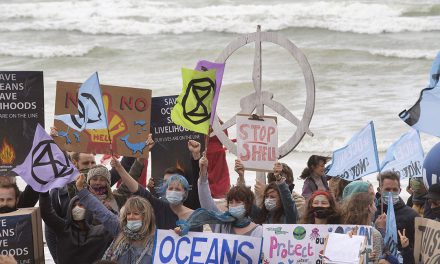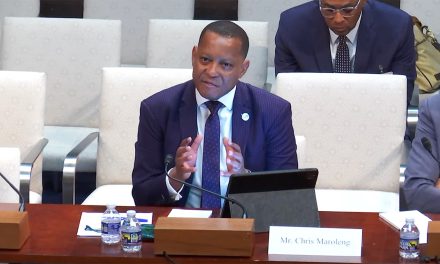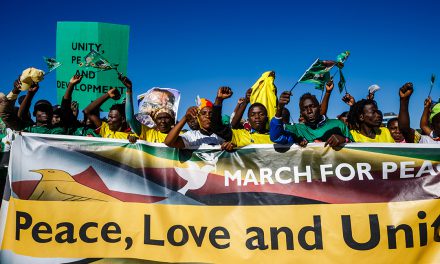Those who provide answers to difficult development questions open themselves to criticism
Nobel prizes in Economics are controversial affairs, understandably. Providing parsimonious answers to difficult development questions is a tough ask, and those who take it on open themselves to criticism. Some of it is useful, while others are unfortunately dressed up in scholarly language that betrays an ideological predisposition instead of deep engagement with the work. One critique recently brought to my attention deserves a response.
Scholars Ingrid Kvangraven, Surbhi Kesar, and Devika Dutt (hereafter KKD) wrote a passionate critique of recent Nobel laureates Daron Acemoglu, Simon Johnson and James Robinson (hereafter AJR), whose work I have often written in admiration of, not least in Business Day.

From L to R: Laureates of the Sveriges Riksbank Prize in Economic Sciences 2024 in Memory of Alfred Nobel: Turkish-American Daron Acemoglu, British-Americans Simon Johnson and James Robinson, in Stockholm, Sweden on December 7, 2024. Photo by Jonathan NACKSTRAND / AFP
The first bold assertion in the KKD critique is that AJR “managed to integrate colonialism into economics without addressing the capitalist dynamics of uneven development”; this is unsubstantiated. AJR have been at pains to demonstrate that uneven development occurs when there is an absence of countervailing power against political and business elites who often collude to impose a technological vision of utopia onto society. This is made very clear in Acemoglu and Johnson’s 2023 book Power and Progress.[1]
It is true that AJR’s work is not structuralist in the sense that they do not blame undefined “capitalist dynamics” for sub-optimal outcomes such as inequality. They do point out, however, that institutional choices under any system – capitalist or otherwise – can produce broad-based development or growing inequality. They deal extensively with the specific question of inequality in various papers, not least of which was a robust response to Thomas Piketty, who, in Acemoglu’s view, did not measure inequality appropriately.[2] The way to address inequality, argue AJR, is not to simply redistribute wealth but to address the drivers of inequality, some of which may be the result of institutional choices. Simply blaming ‘capitalist dynamics’ runs the risk, it seems, of removing agency and resorting to overly structuralist explanations, which see through everything such that they end up seeing nothing at all.
Second, nothing in AJR’s work strikes me as ‘Eurocentric’, a charge that KKD level – it is an easy label to pin on work that one doesn’t like, but it’s not an argument. Anyone who has followed AJR’s work closely will appreciate the lengths to which they and their collaborators have gone to demonstrate the long-run negative effects of colonialism and exploitation, precisely in the formation of extractive institutions under certain political economy conditions. The assertion that AJR embody a Eurocentric view that “reinforces a colonial view of the world that sees the global North economies as naturally better models for development” is lazy analysis at best. It’s a “just-so” story that borders on demonstrating that AJR’s work has not actually been digested, or certainly not the full body of it. For instance, AJR have spilled much ink on understanding different outcomes within the “global North” – a giveaway dichotomous term preferred by structuralists that like the very neat categories they accuse AJR of resorting to.
One such article explores the institutional differences between Sweden and the US, accounting for the differential societal outcomes in respect of redistributive institutions versus those pursuing more competitive innovation.[3] Also, at no point do AJR state that the models exhibited by anybody are “better” for development per se. They simply show that nations which established reliable and consistent political and economic institutions ended up doing better on certain metrics. And one such example that nobody, especially on the left, would disagree with, is the obvious difference between how the former ‘homelands’ in South Africa did versus the rest. Even now, the legacy impact of that destructive political institution – Greater Apartheid – is evident, with unemployment rates significantly higher in former homeland areas still characterised by insecure communal land tenure (as identified by section 25c of our very own constitution.)
Third, the idea that “new institutional economics arose in the 1970s as a further development of neoclassical economics” is highly contested. I would encourage any student to consider that NIE provided a subtle critique and correction to neoclassical economics, though it is a nuanced story. And to argue that AJR’s contribution is “a further development within NIE” in that vein is to underestimate the substantive difference that NIE has made in the economics discipline. For instance, AJR’s 2013 work on the pitfalls of policy advice clearly demonstrates the deficiencies of simply imposing external models onto developing economies and expecting that they will work.[4] Douglass North himself, also a former Nobel prize winner and leader in the NIE field, demonstrated this too with Wallis and Weingast in a 2009 book[5], and the 2012 follow-up[6]. It therefore seems unfair to criticise NIE in its entirety as somehow arguing that failure in the “global South” is due to failure to correct market failures.
Fourth, it is not accurate to summarise AJR’s work as an “inclusive-extractive dichotomy” where “colonialism as a system of extraction is contrasted with capitalism as a system of inclusion.” AJR never define (or defend) ‘capitalism’ as a system, as if it can even be defined neatly. They would rather view the world in terms of institutional choices. In all my reading of AJR’s work, I have never equated ‘capitalism’ in their reading as being synonymous with a ‘system of inclusion.’ Inclusion or exclusion are typically a function of political choice – the elite bargain (in North et al’s terms) that determines the type of political and economic institutions that are built. As the old quip goes, the problem doesn’t seem to lie with ‘capitalism’ – however one defines that – the problem is that no capitalist loves capitalism. But if your predisposition is to define capitalism as a system of accumulation for the owners of technology (means of production) then you are less likely to see the importance of institutional choices. In the reductionist world defined by Marx, we are all either oppressed or oppressors, and that is a dichotomy far more unworkable than the one ostensibly suggested by AJR.
The Eurocentrism of AJR?
Again, the first point under this heading warrants careful consideration. I think it’s an entirely fair point that the establishment of certain types of (‘inclusive’) institutions – broad-based property rights, broad-based taxation, innovation incentives, the development of labour unions as a countervailing power to elites in places with lower rates of settler mortality – was in many respects sustained by establishing extraction elsewhere (the very definition of colonialism). But this was not universal and does not fit neatly into the north-south narrative of uneven development (as if this happened uniformly). There are myriad cases demonstrated in Why Nations Fail and The Narrow Corridor showing how institutional choices were not nearly as uniform as ‘inclusive at home and extractivist abroad’. For instance, China’s elites made choices over time that resulted in under-development that was exacerbated by colonialism but not likely initially caused by it. Again, that does not hold in every case, and AJR’s chapter on Botswana in the analytic narratives book edited by Rodrik in 2004[7] shows how colonialism did not shape Botswana the way it did South Africa and other places, hence the enduring integrity of pre-colonial institutions as a check on power and relatively decent development outcomes.
It seems to me that uneven development is better explained by institutional choices than by capitalism’s global unfolding. Making capitalism the enemy seems to be a function of a precommitment to viewing all negative outcomes as a function of the ‘capitalist system’, which borders on the conspiratorial rather than the empirical. It also seems to me unfair to assert that AJR have an overly simplistic view and are in the end basically saying that the global south failed because of its inability to generate ‘good’ institutions, where ‘good’ means Northern. Their work very clearly aims to account for why ‘good’ institutions did not take root in the ‘global South’ (not a useful grouping) – and to account for colonial extraction as an exogenous shock seems empirically plausible. To say that colonialism simply followed the logic of ‘capitalism’ and to blame the latter for everything removes the ability to account for individual choice and renders one incapable of explaining why Zambia is doing relatively well today over against Zimbabwe, for instance. That is not a path-dependent function of capitalism’s global creation of development alongside underdevelopment; it’s a function of institutional choices that the countries made during colonialism and thereafter. Blaming a ‘capitalist system’ doesn’t sufficiently account for the substantial variation in outcomes we see today.
On the second point, I concede that AJR’s work does not pay much attention per se to the way in which the establishment of property rights regimes entailed dispossession of indigenous groups. Nonetheless, I think it remains fair to say that – as AJR argued in 2001 – the US ended up being a far more prosperous society than Mexico and other Latin American countries. This observation is not an endorsement of violent expropriation or slavery or anything else. But in areas where settler mortality rates were higher, rates of extraction were high and extractivist institutions became dominant (and continued by post-colonial elites). It’s not that AJR ignore the effects of slavery, Jim Crow, etc. – they have written plenty on their harmful effects – it’s simply that the US built institutions which eventually produced more broad-based prosperity than in places with more rapacious colonialism.
I’m also not convinced that AJR unequivocally support ‘market-supporting’ institutions or ignore the “violent ways in which these institutions have been established…” In South Africa, what they showed was that the decimation of property rights through colonialism and then Apartheid was precisely one of the fundamental problems. Expropriation of land through the Native Land Act and the subsequent establishment of ‘bantustans’ were precisely the kind of extractivist institutions they were critiquing. So, to say that AJR ignore injustice or sweep it under the carpet either reflects a deep lack of engagement with their work or an axiomatic blindness to it because of a pre-commitment to the idea that – in this case – establishing property rights was what the apartheid government was doing.
In fact, the colonial and apartheid governments were doing precisely the opposite and establishing an anti-market, anti-competitive and racist set of institutions completely contrary to broad-based property rights – extractivist in every sense, compounded by a migrant labour system that really did produce endemic uneven development. AJR are not ‘upholding private property rights as sacrosanct’ per se – they simply pointed out that where property rights are secure (unlike in the former ‘homelands’) and broad-based, prosperity tends to follow. It’s not justifying the way in which ‘white South Africa’ came to acquire its property rights. AJR’s work on South Africa in their Why Nations Fail blogs clearly shows that they believe in the necessity of redistribution and restitution.[8]
The third criticism – that AJR’s framework leads us to think of “development as a techno-bureaucratic process of policy fixes, thus depoliticising the process of capitalist development” – also seems unjustified. I’d argue that it’s a misreading of AJR’s work. The 2013 paper referenced earlier is at pains to recognise the role of politics in development dynamics and the wrong-headedness of importing externally formulated institutions that are incentive-incompatible with the distribution of existing political power. It’s also not accurate to argue that the key policy prescriptions flowing from AJR’s work are essentially a form of post-Washington Consensus. KKD reference Afghanistan as an example of what they perceive to be AJR’s policy prescriptions, but if they had read Acemoglu’s own work on Afghanistan, they would have seen that they have a lot more in common with AJR than they might like to realise. Here are AJR’s own words: “Although the United States clearly could have done a better job of managing its departure from Afghanistan, the tragedy playing out this month [August 2021] has been 20 years in the making. From the outset, America and its allies embraced – and never reconsidered – a top-down state-building strategy that was always destined to fail.”[9]
In closing, the argument that AJR’s framework is basically racist and doesn’t address the thing it purports to was always going to emerge because of the critiquing authors’ (purposeful?) misreading of AJR. To say that the AJR work is unfalsifiable is perhaps highly ironic given that the axiomatic view underpinning the critique is that the capitalist ‘system’ drove colonialism, rather than seeing differential institutional choices under colonialism as producing path-dependent impacts. AJR see colonialism and its extractivist modes as a set of institutional choices that differed from place to place. They also refrain from making blanket policy recommendations along the lines that the critics suggest they do. Post-independence, African states must surely ask themselves whether continued underdevelopment can be solely attributed to a nebulous ‘capitalist system’. Surely it stands to reason that countries’ leaders make institutional choices, and those choices have consequences – the choices made by the US in Afghanistan were clearly disastrous, and AJR fully agree!
African elites have also made choices in response to the choices made elsewhere, often to enrich a select few at the expense of the majority. They also often perpetuate the very extractivist institutions (‘homelands’, for example, in the form of the Ngonyama Trust, etc.) that created impoverishment in the first instance. To ignore this under the axiom that South Africa struggles because of the ravages of an undefined ‘system of capitalism’ is to eradicate grounds for individual accountability and ignore the wilful institutional choices that the post-1994 government has made. AJR’s work, broadly falling within the ambit of NIE, has done more for economics than many seem to understand in respect of elucidating the role of politics in global development.
[1] Daron Acemoglu and Simon Johnson, Power and Progress: Our Thousand-Year Struggle over Technology and Prosperity (Public Affairs, 2023), https://doi.org/10.1093/ia/iiad251.
[2] Daron Acemoglu and James A. Robinson, ‘The Rise and Decline of General Laws of Capitalism’, Journal of Economic Perspectives 29, no. 1 (2015): 3–28, https://doi.org/10.1257/jep.29.1.3.
[3] Daron Acemoglu, James A Robinson, and Thierry Verdier, ‘Asymmetric Growth and Institutions in an Interdependent World’, Journal of Political Economy, 2017, http://www.journals.uchicago.edu.ezproxy.uct.ac.za/doi/pdfplus/10.1086/693038.
[4] Daron Acemoglu and James A Robinson, ‘Economics versus Politics: Pitfalls of Policy Advice’, Journal of Economic Perspectives 27, no. 2 (February 2013): 173–92, https://doi.org/10.1257/jep.27.2.173.
[5] Douglass C North, John J Wallis, and Barry R Weingast, Violence and Social Orders: A Conceptual Framework for Interpreting Recorded Human History (Cambridge University Press, 2009), http://books.google.com/books?id=e48I6-Xgt8UC&pgis=1.
[6] Douglass C North et al., In the Shadow of Violence: Politics, Economics, and the Problems of Development, ed. Douglass C. North et al., 1st ed. (Cambridge University Press, 2012), http://www.cambridge.org/us/academic/subjects/economics/economic-development-and-growth/shadow-violence-politics-economics-and-problems-development.
[7] Daron Acemoglu, Simon H Johnson, and James A Robinson, ‘An African Success Story: Botswana’, SSRN Electronic Journal, 2001, https://doi.org/10.2139/ssrn.290791.
[8] https://web.archive.org/web/20190303120407/http://whynationsfail.com/, accessed 1 November 2024.
[9] https://www.project-syndicate.org/commentary/afghanistan-top-down-state-building-failed-again-by-daron-acemoglu-2021-08, accessed 1 November 2024.
This article first appeared in Business Day.
Dr Ross Harvey is a natural resource economist and policy analyst, and he has been dealing with governance issues in various forms across this sector since 2007. He has a PhD in economics from the University of Cape Town, and his thesis research focused on the political economy of oil and institutional development in Angola and Nigeria. While completing his PhD, Ross worked as a senior researcher on extractive industries and wildlife governance at the South African Institute of International Affairs (SAIIA), and in May 2019 became an independent conservation consultant. Ross’s task at GGA is to establish a non-renewable natural resources project (extractive industries) to ensure that the industry becomes genuinely sustainable and contributes to Africa achieving the Sustainable Development Goals (SDGs). Ross was appointed Director of Research and Programmes at GGA in May 2020.












